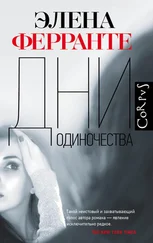A confusion that I was part of. Sometimes I imagined that a violent struggle between my father and his sister was taking place in me, and I hoped that he would win. Of course—I reflected—Vittoria had already prevailed once, at the moment of my birth, since for a while I had been an intolerable child; but then—I thought with relief—I turned into a good little girl, so it’s possible to get rid of her. I tried to reassure myself that way and, in order to feel strong, forced myself to see my parents in myself. But especially at night, before going to bed, I would look at myself in the mirror yet again, and it seemed I had lost them long ago. I should have had a face that synthesized the best of them and instead I was getting the face of Vittoria. I was supposed to have a happy life and instead an unhappy period was starting, utterly without the joy of feeling the way they had felt and still did.
6.
I tried to find out, after a while, if the two sisters, Angela and Ida, my trusted friends, were aware of any deterioration, and if Angela, in particular, who was the same age as me (Ida was two years younger), was also changing for the worse. I needed a gaze that would evaluate me, and it seemed to me that I could count on them. We had been brought up in the same way by parents who had been friends for decades and had the same views. All three of us, to be clear, had not been baptized, all three didn’t know any prayers, all three had been precociously informed about the functioning of our bodies (illustrated books, educational videos with animated cartoons), all three knew that we should be proud of being born female, all three had gone to first grade not at six but at five, all three always behaved in a responsible manner, all three had in our heads a dense network of advice useful for avoiding the traps of Naples and the world, all three could turn to our parents at any time to satisfy our curiosities, all three read a lot, and, finally, all three had a sensible disdain for consumer goods and the tastes of our contemporaries, even though, encouraged by our teachers, we were well informed about music, film, television programs, singers, and actors, and in secret wanted to become famous actresses with fabulous boyfriends with whom we shared long kisses and genital contact. Of course, the friendship between Angela and me was closer, since Ida was younger, but she could surprise us, and in fact read more than we did and wrote poems and stories. And so, as far as I remember, there were no conflicts between them and me, and if there were we could speak to each other frankly and make peace. So, considering them reliable witnesses, I questioned them cautiously a couple of times. But they didn’t say anything unpleasant: in fact, they seemed to appreciate me quite a bit, and for my part I thought they seemed to keep getting prettier. They were well proportioned, so carefully modeled that just the sight of them made me feel a need for their warmth, and I hugged and kissed them as if I wanted to fuse them to myself. But one night when I was feeling down they happened to come for dinner at San Giacomo dei Capri with their parents, and things got complicated. I wasn’t in a good mood. I felt especially out of place, gangling, lanky, pale, coarse in every word and gesture, and therefore ready to pick up allusions to my deterioration even when there weren’t any. For example Ida asked, pointing to my shoes:
“Are they new?”
“No, I’ve had them forever.”
“I don’t remember them.”
“What’s wrong with them.”
“Nothing.”
“If you noticed them now, it means that now something’s wrong.”
“No.”
“Are my legs too thin?”
We went on like that for a while, they reassuring me, I digging into their reassurances to find out if they were serious or hiding behind good manners the ugly impression I’d made. My mother intervened in her weary tone, saying: Giovanna, that’s enough, you don’t have skinny legs. I was ashamed and shut up immediately, while Costanza, Angela and Ida’s mother, emphasized, you have lovely ankles, and Mariano, their father, exclaimed, laughing: excellent thighs, they’d be delicious roasted with potatoes. He didn’t stop there, but kept teasing me, joking constantly—he was that person who thinks he can bring good cheer to a funeral.
“What’s wrong with this girl tonight?”
I shook my head to indicate that nothing was wrong, and tried to smile but couldn’t; his way of being funny made me nervous.
“Such nice hair, what is it, a sorghum broom?”
Again I shook my head no, and this time I couldn’t hide my annoyance, he was treating me as if I were a child of six.
“It’s a compliment, sweetheart: sorghum is a plump plant, part green, part red, and part black.”
I responded darkly:
“I’m not plump, or green, or red, or black.”
He stared at me in bewilderment, smiled, spoke to his daughters.
“Why is Giovanna so grim tonight?”
“I’m not grim.”
“Grim isn’t an insult, it’s the manifestation of a state of mind. You know what it means?”
I was silent. He again turned to his daughters, pretending to be despondent.
“She doesn’t know. Ida, you tell her.”
Ida said unwillingly: “That you have a scowl on your face. He says it to me, too.”
Mariano was that sort of person. He and my father had known each other since their university days, and because they’d stayed friends he had always been present in my life. A little heavy, completely bald, with blue eyes, he had impressed me since I was a small child because his face was too pale and slightly puffy. When he showed up at our house, which was often, he would talk with his friend for hours and hours, inserting into every sentence a bitter discontent that made me nervous. He taught history at the university and contributed regularly to a prestigious Neapolitan journal. He and Papa argued constantly, and even though we three girls understood little of what they were saying, we had grown up with the idea that they had assigned themselves a very difficult task that required study and concentration. But, unlike my father, Mariano didn’t merely study day and night, he also railed loudly against numerous enemies—people in Naples, Rome, and other cities—who wanted to prevent them from doing their work properly. Angela, Ida, and I, even if we weren’t able to state a position, were always for our parents and against those who didn’t like them. But, in the end, in all their discussions the only thing that had interested us since childhood was the bad words in dialect that Mariano uttered against people who were famous at the time. That was because the three of us—especially me—were not only forbidden to use swear words but also, more generally, to utter a syllable in Neapolitan. A useless ban. Our parents didn’t prohibit us from doing anything, but even when they did, they were indulgent. So, under our breath, just for fun, we repeated to each other the names and last names of Mariano’s enemies accompanied by the obscene epithets we had heard. But while Angela and Ida found that vocabulary of their father’s merely amusing, I couldn’t separate it from an impression of spite.
Wasn’t there always something malevolent in his jokes? Wasn’t there that evening as well? I was grim, I had a scowl on my face, I was a sorghum broom? Had Mariano merely been joking or, joking, had he cruelly spoken the truth? We sat down at the table. The adults started a tedious conversation about some friends or other who were planning to move to Rome, we suffered our boredom in silence, hoping that dinner would be over quickly so we could take refuge in my room. The whole time I had the impression that my father never laughed, my mother barely smiled, Mariano laughed a lot, and Costanza, his wife, not too much but heartily. Maybe my parents weren’t having fun like Angela and Ida’s because I had made them sad. Their friends were happy with their daughters, while they were no longer happy with me. I was grim, grim, grim, and just seeing me there at the table kept them from feeling happy. How serious my mother was and how pretty and happy Angela and Ida’s mother. My father was now pouring her some wine, he spoke to her with polite aloofness. Costanza taught Italian and Latin; her parents were very wealthy and had given her an excellent upbringing. She was so elegant that sometimes my mother seemed to be studying her, in order to imitate her, and, almost without realizing it, I did the same. How was it possible that that woman had chosen a husband like Mariano? The brilliance of her jewelry, the colors of her clothes, which always looked perfect, dazzled me. Just the night before I had dreamed that with the tip of her tongue she was lovingly licking my ear like a cat. And the dream had brought me comfort, a sort of physical well-being that for several hours after I woke up had made me feel safe.
Читать дальше
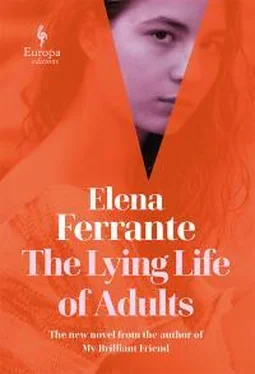
![Элена Ферранте - История о пропавшем ребенке [litres]](/books/32091/elena-ferrante-istoriya-o-propavshem-rebenke-litres-thumb.webp)
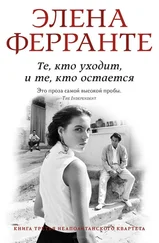
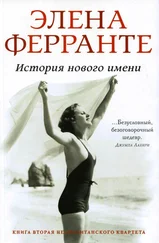
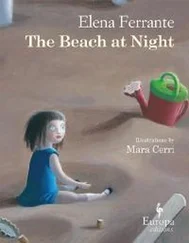
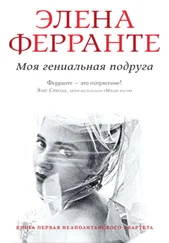
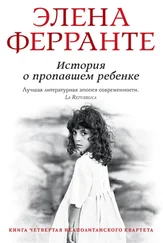
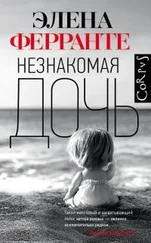
![Элена Ферранте - Дни одиночества [litres]](/books/404671/elena-ferrante-dni-odinochestva-litres-thumb.webp)


